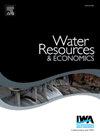The impact of water pollution on health expenditures of residents:Evidence from urban sewage in China
IF 1.9
3区 经济学
Q2 ECONOMICS
引用次数: 0
Abstract
Controlling the negative externalities of environmental pollution and reducing living costs of residents have long been main societal concerns. With the ongoing deterioration of the ecological environment, understanding the relationship between urban sewage pollution and health expenditures of residents has become increasingly critical. Drawing on extensive theoretical analysis, this study employs data from 266 Chinese cities spanning the period from 2012 to 2022 to investigate the health cost effect of urban sewage pollution. The findings reveal that urban sewage pollution not only significantly increases health expenditures of local residents but also exerts a positive spatial spillover effect on the health expenditures of surrounding residents. Education, advanced industrial structure, medical insurance, and agricultural mechanization can linearly and negatively mitigate the impact of urban sewage pollution. The local and spatial moderating effect of economic development exhibit an inverted U-shape. Furthermore, advanced industrial structure, agricultural mechanization and highly coordinated river management systems with clear accountability effectively suppress the negative externalities associated with urban sewage pollution. This study, which provides a scientific basis for accurately assessing the health costs of urban sewage pollution, is conducive to building a "green defense line" for residents' health expenditures and facilitating the achievement of the Sustainable Development Goals of United Nations.
水污染对居民健康支出的影响:来自中国城市污水的证据
控制环境污染的负外部性和降低居民的生活成本一直是社会关注的主要问题。随着生态环境的不断恶化,了解城市污水污染与居民健康支出之间的关系变得越来越重要。在广泛的理论分析基础上,本研究采用了2012年至2022年中国266个城市的数据,研究城市污水污染的健康成本效应。研究发现,城市污水污染不仅显著增加了当地居民的卫生支出,而且对周边居民的卫生支出产生了正的空间溢出效应。教育、先进产业结构、医疗保险和农业机械化对城市污水污染的影响具有线性和负向的缓解作用。经济发展对区域和空间的调节作用呈倒u型。此外,先进的产业结构、农业机械化和高度协调的河流管理系统有效地抑制了与城市污水污染相关的负外部性。本研究为准确评估城市污水污染健康成本提供了科学依据,有利于为居民健康支出构筑“绿色防线”,促进联合国可持续发展目标的实现。
本文章由计算机程序翻译,如有差异,请以英文原文为准。
求助全文
约1分钟内获得全文
求助全文
来源期刊

Water Resources and Economics
Environmental Science-Water Science and Technology
CiteScore
5.00
自引率
0.00%
发文量
17
审稿时长
51 days
期刊介绍:
Water Resources and Economics is one of a series of specialist titles launched by the highly-regarded Water Research. For the purpose of sustainable water resources management, understanding the multiple connections and feedback mechanisms between water resources and the economy is crucial. Water Resources and Economics addresses the financial and economic dimensions associated with water resources use and governance, across different economic sectors like agriculture, energy, industry, shipping, recreation and urban and rural water supply, at local, regional and transboundary scale.
Topics of interest include (but are not restricted to) the economics of:
Aquatic ecosystem services-
Blue economy-
Climate change and flood risk management-
Climate smart agriculture-
Coastal management-
Droughts and water scarcity-
Environmental flows-
Eutrophication-
Food, water, energy nexus-
Groundwater management-
Hydropower generation-
Hydrological risks and uncertainties-
Marine resources-
Nature-based solutions-
Resource recovery-
River restoration-
Storm water harvesting-
Transboundary water allocation-
Urban water management-
Wastewater treatment-
Watershed management-
Water health risks-
Water pollution-
Water quality management-
Water security-
Water stress-
Water technology innovation.
 求助内容:
求助内容: 应助结果提醒方式:
应助结果提醒方式:


